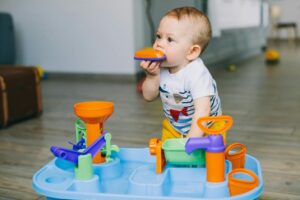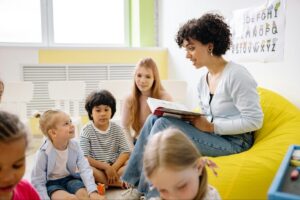Early childhood is a highly important phase of child development. If parents and community members are educated, and community becomes involved in school, it will transform the whole life of the child. When parents and society become involved in the education of a child, the child receives many benefits from it. Today, in this blog, let us observe the ways in which parental contribution during early education and the positive role that the community plays make children bloom.
Why Family Involvement is Important in Early Childhood Education
Involvement of family in education is vital in children. When the parents are involved in their child’s education, their child becomes more motivated and confident. It also leads them to excel in school. Parents who help with homework, join activities in school, and show interest in their child’s education encourage them to study hard and stay concentrated.
Children feel more confident and secure if they see that their parents have an interest in their education. Such support adds to improved learning and emotional well-being. It also helps them to develop enhanced social skills. Family participation in school events and meetings strengthens parent-teacher unity, creating a healthy atmosphere for the child.
The Role of Community in Supporting Early Education
The community also plays a critical role in success in early childhood education. Neighbors, close family members, and families can promote children’s education through other learning materials and experiences. The social networks in communities provide assurance that the child receives an all-round education as well as acquires new experiences from outside the school environment.
Learning activities at the community level, such as after-school activities, sports, or volunteering, allow children to take up new interest and talent domains. The higher the involvement of the community, the more supported children feel when it comes to learning. Children recognize that learning is not only what happens at school but also what happens within the community.
The Collaborative Nature of Learning
When schools, parents, and communities work together, they create a learning community. This helps children feel safe and encouraged to learn. When teachers and parents have dialogue and talk frequently, they can create a learning environment where children feel valued.
By being involved, families and communities help children stay on track with their goals and provide them with the support they need in order to succeed. School-family-community partnerships are a powerful way of creating a solid foundation for a child’s education and well-being.
How Families and Communities Can Work Together
There are many ways parents and the community can collaborate in promoting early childhood education. One of them is attending school activities like parent-teacher meetings. This makes sure that parents are well aware of how their child is doing and can collaborate with teachers to address any issues.
Families can also support their child’s learning at home by reading together, discussing the school day with the child, and developing a love of learning. Communities can help by offering educational resources, sponsoring events, and offering safe spaces for children to play and learn.
FAQs
1. Why is family involvement in early childhood education important?
When parents are involved, children feel supported. They are more likely to stay motivated, academically advance, and learn social skills. Parents who are interested in their child’s education empower them to succeed.
2. How can communities assist early childhood education?
Communities can assist children by offering after-school programs, volunteering, and creating a positive environment where children can learn and grow. They provide extra resources that allow children to succeed.
3. What are school-family-community partnerships good for?
Partnerships bring a sense of a whole lot closer relationship between school and home. Children feel more supported and valued and so perform better academically and emotionally. Parents, teachers, and the community work together, which results in a more effective learning environment for children.
4. How do I get more involved in my child’s early education?
You can get engaged by attending parent-teacher sessions, volunteering for school activities, and supporting learning at home. Show your child that you care about their education.
5. What are the most significant benefits of community-based learning for preschool children?
Community-based learning allows kids to learn social skills and gain actual-life experiences. It helps them become confident as they learn from other individuals and learn new things apart from school.
Tips to Parents and Communities to Create an Encouraging Early Education Environment
1. Engage at home: Make learning come home by reading with your child and asking him or her what happened at school. It lets them know you care about what they are studying and keeps them interested.
2. Attend school events: Meet with teachers in parent-teacher conferences and join school events. It keeps you informed and conveys to the child that he or she studies is important to you.
3. Participate in community programs: Work with local community programs that enhance children’s education. Whether it is volunteer work or attending events, every contribution matters.
4. Encourage inclusive practices: Create an open setting at home and within the community. Teach children to embrace differences and value each other’s strengths and capabilities.
5. Form a good partnership: Work together with teachers and parents to meet the needs of your child. Mutual communication between school and families yields a conducive environment for learning.
Conclusion
In short, parental involvement in education and civic engagement in schools are key to a child’s success and well-being. When families and communities work together, they create an environment for kids to learn in which they are supported. Such cooperation between the parents, school, and society guarantees that kids stay encouraged, are secure, and maximize their potential. As such, volunteer and actively engage in your child’s learning so that they excel.




